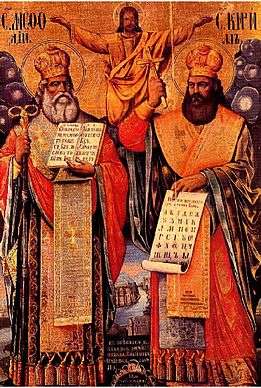863
| Millennium: | 1st millennium |
|---|---|
| Centuries: | 8th century · 9th century · 10th century |
| Decades: | 830s · 840s · 850s · 860s · 870s · 880s · 890s |
| Years: | 860 · 861 · 862 · 863 · 864 · 865 · 866 |
| 863 by topic | |
| Politics | |
| State leaders – Sovereign states | |
| Birth and death categories | |
| Births – Deaths | |
| Establishment and disestablishment categories | |
| Establishments – Disestablishments | |
| Gregorian calendar | 863 DCCCLXIII |
| Ab urbe condita | 1616 |
| Armenian calendar | 312 ԹՎ ՅԺԲ |
| Assyrian calendar | 5613 |
| Bengali calendar | 270 |
| Berber calendar | 1813 |
| Buddhist calendar | 1407 |
| Burmese calendar | 225 |
| Byzantine calendar | 6371–6372 |
| Chinese calendar | 壬午年 (Water Horse) 3559 or 3499 — to — 癸未年 (Water Goat) 3560 or 3500 |
| Coptic calendar | 579–580 |
| Discordian calendar | 2029 |
| Ethiopian calendar | 855–856 |
| Hebrew calendar | 4623–4624 |
| Hindu calendars | |
| - Vikram Samvat | 919–920 |
| - Shaka Samvat | 784–785 |
| - Kali Yuga | 3963–3964 |
| Holocene calendar | 10863 |
| Iranian calendar | 241–242 |
| Islamic calendar | 248–249 |
| Japanese calendar | Jōgan 5 (貞観5年) |
| Javanese calendar | 760–761 |
| Julian calendar | 863 DCCCLXIII |
| Korean calendar | 3196 |
| Minguo calendar | 1049 before ROC 民前1049年 |
| Nanakshahi calendar | −605 |
| Seleucid era | 1174/1175 AG |
| Thai solar calendar | 1405–1406 |
| Wikimedia Commons has media related to 863. |

Cyril and Methodius (left) arrive in Moravia
Year 863 (DCCCLXIII) was a common year starting on Friday (link will display the full calendar) of the Julian calendar.
Events
By place
Byzantine Empire
- September 3 – Battle of Lalakaon: A Byzantine army under Petronas confronts an invasion by Muslim forces led by Umar al-Aqta, Emir of Malatya. The Muslims raid deep into Byzantine territory, reaching the Black Sea coast at the port city of Amisos. Petronas annihilates the Arabs near the River Lalakaon in Paphlagonia (modern Turkey).
Europe
- January 25 – Emperor Louis II claims Provence after the death of his brother Charles. King Lothair II receives Lower Burgundy and a part of the Jura Mountains.
- King Louis the German suppresses the revolt of his son Carloman (for the second time) who wants a partition, mainly of Bavaria, of the East Frankish Kingdom.
- Viking raiders again plunder Dorestad (modern Netherlands). A Frankish port on the mouth of the River Rhine, it thereafter disappears from the chronicles.
- Danish Vikings looting along the River Rhine, they settle on an island close by Cologne but are driven off by a combined attack of Lothair II and Saxons.
- The Christianization of the Rus' Khaganate begins ceasing the dominance of the 63-year-long Rus' Khaganate (approximate date).
- The first written record of Smolensk (according to the primary Chronicle).
Britain
- King Osberht of Northumbria engages in a dispute for royal power with a rival claimant named Ælla. After Osberht is replaced, Ælla wields power in Northumbria but the civil war continues.[1]
Asia
- Duan Chengshi, Chinese author and scholar, writes about Chinese maritime trade and Arab-run slave trade in East Africa.[2]
By topic
Religion
- Pope Nicholas I sends archbishops Gunther and Theotgaud to a synod of Metz which confirms the permission given to king Lothair II of Lotharingia to remarry.
- The Byzantine missionaries Cyril and Methodius arrive with a few disciples in Moravia upon a request of prince Rastislav.[3]
- Nicholas I excommunicates patriarch Photios I of Constantinople.
Births
- Bertha, daughter of Lothair II (d. 925)
- Li Decheng, general of Wu (Five Dynasties) (d. 940)
- Louis III, king of the West Frankish Kingdom (or 865)
- Shen Song, chancellor of Wuyue (d. 938)
- Wang Yanzhang, general of Later Liang (d. 923)
Deaths
- January 25 – Charles of Provence, Frankish king (b. 845)
- June 4 – Charles, archbishop of Mainz
- June 6 – Abu Musa Utamish, Muslim vizier
- October 4 – Turpio, Frankish nobleman
- Ali ibn Yahya al-Armani, Muslim governor
- Bivin of Gorze, Frankish nobleman
- Daniél ua Líahaiti, Irish abbot and poet
- Duan Chengshi, Chinese official and scholar
- Karbeas, leader of the Paulicians
- Mucel, bishop of Hereford (approximate date)
- Muirecán mac Diarmata, king of Leinster
- Umar al-Aqta, emir of Melitene
References
- ↑ Kirby, p. 197.
- ↑ Levathes, p. 38.
- ↑ Barford 2001, pp. 109–110.
This article is issued from Wikipedia - version of the 11/10/2016. The text is available under the Creative Commons Attribution/Share Alike but additional terms may apply for the media files.